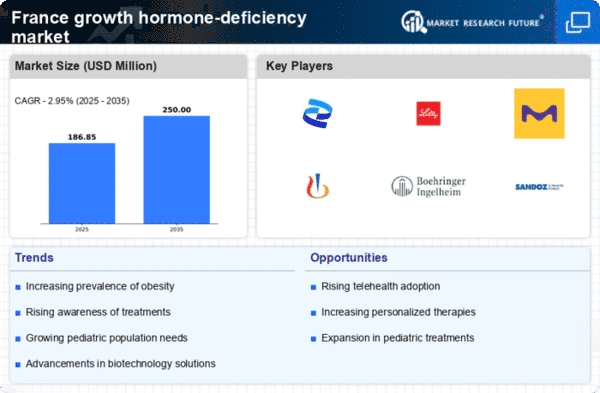Rising Healthcare Expenditure
Rising healthcare expenditure in France is likely to play a pivotal role in the growth hormone-deficiency market. As the government and private sectors increase their spending on healthcare services, more resources are becoming available for the diagnosis and treatment of growth hormone deficiency. Reports indicate that healthcare expenditure in France has been growing at an annual rate of approximately 3-4%, which may lead to improved access to growth hormone therapies. This increase in funding could facilitate the development of new treatment options and enhance patient access to existing therapies. Consequently, the growth hormone-deficiency market is expected to benefit from this upward trend in healthcare spending, potentially leading to a broader range of treatment options and improved patient outcomes.
Enhanced Patient Support Programs
Enhanced patient support programs are emerging as a vital driver for the growth hormone-deficiency market in France. These programs, often initiated by pharmaceutical companies and healthcare organizations, aim to provide comprehensive support to patients and their families throughout the treatment journey. By offering educational resources, counseling, and financial assistance, these initiatives may help alleviate some of the barriers to treatment adherence. Furthermore, patient support programs can foster a sense of community among individuals affected by growth hormone deficiency, encouraging them to seek timely medical advice and treatment. As awareness of these programs increases, it is likely that more patients will engage with the healthcare system, thereby driving growth in the market.
Growing Investment in Healthcare Infrastructure
The growth hormone-deficiency market in France is benefiting from increased investment in healthcare infrastructure, which appears to be a crucial driver for market development. The French government has been allocating substantial resources to enhance healthcare facilities and services, particularly in pediatric care. This investment is likely to improve access to specialized care for children with growth hormone deficiency, facilitating timely diagnosis and treatment. Furthermore, the establishment of specialized clinics and training programs for healthcare professionals may enhance the quality of care provided. As a result, the growth hormone-deficiency market is expected to expand, with more patients receiving appropriate therapies and follow-up care, ultimately leading to better health outcomes.
Technological Innovations in Treatment Delivery
Technological advancements in the delivery of growth hormone therapies are poised to significantly impact the growth hormone-deficiency market in France. Innovations such as needle-free injection systems and smart delivery devices are enhancing patient compliance and comfort, which may lead to increased treatment uptake. For instance, the introduction of pre-filled syringes and wearable devices that monitor hormone levels could streamline the treatment process, making it more accessible for patients. Additionally, the integration of digital health solutions, such as mobile applications for tracking treatment progress, is likely to empower patients and healthcare providers alike. These technological innovations not only improve the overall treatment experience but also have the potential to expand the market by attracting new patients who may have previously been hesitant to pursue therapy.
Increasing Prevalence of Growth Hormone Deficiency
The growth hormone-deficiency market in France is experiencing a notable increase in prevalence rates, which appears to be a significant driver for market expansion. Recent studies indicate that approximately 1 in 4,000 children are diagnosed with growth hormone deficiency, leading to a growing patient population requiring treatment. This rising incidence is likely to stimulate demand for growth hormone therapies, as healthcare providers become more vigilant in diagnosing this condition. Furthermore, the increasing awareness among parents and healthcare professionals about the symptoms and long-term implications of untreated growth hormone deficiency may contribute to earlier diagnosis and intervention. As a result, the growth hormone-deficiency market is expected to see a steady increase in both patient numbers and treatment options available, thereby enhancing market growth prospects in the coming years.
















